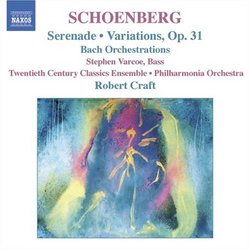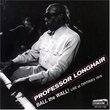| All Artists: Arnold Schoenberg, Robert Craft, Twentieth Century Classics Ensemble, Philharmonia Orchestra of London, Philharmonia Chamber Orchestra Title: Schoenberg: Serenade; Variations, Op. 31; Bach Orchestrations Members Wishing: 0 Total Copies: 0 Label: Naxos Original Release Date: 1/1/2006 Re-Release Date: 4/18/2006 Genre: Classical Styles: Chamber Music, Historical Periods, Classical (c.1770-1830), Modern, 20th, & 21st Century Number of Discs: 1 SwapaCD Credits: 1 UPC: 747313252220 |
Search - Arnold Schoenberg, Robert Craft, Twentieth Century Classics Ensemble :: Schoenberg: Serenade; Variations, Op. 31; Bach Orchestrations
 | Arnold Schoenberg, Robert Craft, Twentieth Century Classics Ensemble Schoenberg: Serenade; Variations, Op. 31; Bach Orchestrations Genre: Classical
|
Larger Image |
CD DetailsSimilar CDs |
CD ReviewsBetter performances elsewhere of these pieces Peter Heddon | 11/16/2006 (4 out of 5 stars) "Serenade is one of Schoenberg's most charming works,though the affable dance rhythms are always tinged with a sarcastic/dark quality. This enjoyable performance takes a more relaxed view than the 1974 version by the London Sinfonietta (Decca)and frankly i prefer their more incisive/hard edged approach.This may have more to do with Robert Craft's direction than the players themselves who have excellent credentials. Variations 0p.31 sound lumpy when set alongside the classic recording by Karajan:the 5th and 8th variations make for a particularly telling comparison.Viscerally exciting in the Karajan,they seem to stagger along without any volition in the Craft recording. Partly it's a question of the hauptstimme(main line)which is less clearly pointed,and you're left with all the subsidurary material on the top layer as well." Exploring Schoenberg's Music with Robert Craft Robin Friedman | Washington, D.C. United States | 01/15/2010 (5 out of 5 stars) "Arnold Schoenberg's (1874 -- 1951)music remains forbidden territory for many lovers of music. As with any composer, repeated, varied, and open-hearted listening is the best way to try to get to know these works. Music worthy of its name speaks to the heart. Schoenberg, difficult as he is, has the unjust reputation of a purely "cerebral" composer. The recent issues and reissues of Robert Craft's recordings of Schoenberg on Naxos have given me the opportunity to explore much of Schoenberg. These recordings should prove useful for other listeners as well. The CD I am reviewing here, which consists of the Serenade, opus 24, the Variations for Orchestra, opus, 31, and Bach orchestrations, is available individually or as part of a five-CD box of Schoenberg's music. The Works of Arnold Schoenberg, Vol. 1 The CD features Craft's excellent liner notes. I have been finding it helpful to my listening to share my comments on this music with other readers. In particular, I hope to encourage those who may be interested in approaching this music for the first time to do so. Schoenberg's Serenade dates from 1923 at the time the composer was developing his twelve tone style. But only one of the seven movements of this work, the forth movement setting of a sonnet by Petrarch, is composed in twelve tones. The generally accessible and relaxed style of the Serenade makes it an excellent introduction to Schoenberg's later style. The work is in seven movement and scored for seven instruments, clarinet, bass clarinet, mandolin, guitar, violin, viola, and cello together with a bass or baritone singer in the Petrarch. Bass Stephen Varcoe sings here in a recording which dates from 1994. The centerpiece of this work is Petrarch's sonnet in which the singer laments his lost love and the continued hold she has over his emotions. The tortured feelings are given expression in the "atonal" character of the vocal line with its counterpointed instrumental accompaniment. Text and translation of the sonnet are included in the liner notes. Most of the remainder of the Serenade is music of lightness and gaiety, which seems designed to cure the singer in the sonnet of his sadness. Schoenberg was a master of instrumentation. The unusual, close-knit character of the voices make this work a delight. The Serenade opens with a march movement and includes two dance movements, a second, marked "menuet" and the varied fifth movement titled "dance steps". The third movement consists of a set of short, easy to follow variations and the sixth movement is a lyrical "song without words." The concluding movement recapitulates much of the music that proceeds it, beginning with the march and concluding with the lyrical moments of the dances and the song. Completed in 1928, Schoenberg's Variations for Orchestra is among his greatest and most challenging scores. The recording here with Craft and the Philharmonia Orchestra dates from 1998. The work is in the twelve tone manner. It consists of a theme, a set of 9 variations, an introduction, and a finale. In addition to the variation theme, stated at the outset of the work, Schoenberg uses a theme based upon the name B-A-C-H ("H" is B-flat). The "B-A-C-H" theme is stated by the trombones in the second movement of the work and reappears at climactic moments in what follows. With its Bachian theme and twelve tone style, this piece is heavily contrapuntal. The variation movements alternate between sections for large orchestra and more intimate moments for small combinations of instruments. These variations have a dance-like character similar to the dance movements of the Serenade. Each variation is discrete and easy to identify after a few hearings. The fifth variation is for full orchestra and reaches its climax in the statement of the B-A-C-H theme. The finale again recapitulates much of the proceeding music with an emphasis on B-A-C-H. Bach obviously was a composer who influenced Schoenberg deeply, and the final work on this CD consists of a set of three transcriptions of Bach's organ music for orchestra that Craft also recorded with the Philharmonia Orchestra in 1998. Schoenberg devoted substantial attention to transcribing music by earlier composers, including Brahms, Handel, and Monn (an early classical composer) into his own idiom. Although they are distinctly Schoenberg's own, the Bach transcriptions on the whole stay closer to the original composer's own notes than do the other transcriptions. Schoenberg himself regarded these works as "popularizations" and they have little if any of the difficulty that listeners may experience with Schoenberg's more characteristic compositions. The pieces are characterized by the clarity and variety of Schoenberg's orchestrations, most successfully in Schoenberg's transcription of Bach's Saint Anne Fugue in which each section of the work is given to a different combination of orchestral instruments. The other two works are taken from Bach's Chorale Preludes and feature a cello solo in the shorter of the two Preludes and a variety of orchestral colorations in the other, longer, work. I am looking forward to hearing more of Schoenberg in a new 6-CD compilation by Craft on Naxos. Robert Craft Edition 2 Robin Friedman" SCHOENBERG's SERENADE... Sébastien Melmoth | Hôtel d'Alsace, PARIS | 07/05/2006 (5 out of 5 stars) "
Schoenberg's Serenade for septet w/bass [baritone] voice is one of his most charming and approachable works. It's tasty scoring includes guitar, mandolin, and bass clarinet: yummy! The voice appears in only one song--a setting of a Petrarch sonnet in German translation. British bass/baritone Stephen Varcoe is an old hand with this work. The recording itself is (I believe) a reissue of the complete Schoenberg done by Robert Craft in the '60s. It was a great series, and of course Craft is to be commended. It is not as well known as it should that Schoenberg was one of the great orchestrators of classical music. Korsakov, Berlioz, and sometimes Mahler and others are widely thought of as having been great orchestrators; however, Schoenberg had one of the finest ears for instrumental timbres, and he had the knowledge and intuition to be able to transcribe his musical ideas onto paper and into actual sound. Withal, especially his Bach and Brahms orchestral transcriptions are marvelous. The Op. 31 Orchestral Variations is Schoenberg's tour de force of orchestration and musical logic. (His Op. 36 Violin Concerto runs a close second!) Really, however, von Karajan/BPO's realization on DG is the best available. Just consider it a bonus ont this disc wherein the Serenade is the highlight, with the Bach a very pleasant after dinner mint! Cheers! ;)" |

 Track Listings (22) - Disc #1
Track Listings (22) - Disc #1
